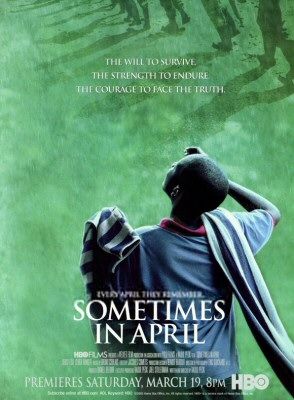A couple weeks ago, I wrote a post about what happened in Rwanda 20 years ago. The first of what I hope to be many film reviews in this blog covers a movie based on those grim events: Sometimes in April.
MY INTRODUCTION TO THE FILM. My introduction to the film was by complete accident. It was back on March 19, 2005. I had tuned into HBO with the intent of watching the Manny Pacquiao vs. Erik Morales fight. Having not heard anything about an undercard for the fight, I thought it was being broadcast as part of HBO World Championship Boxing. To my surprise, the fight was being broadcast on HBO PPV as I found out when HBO programming promo said “Next on HBO…the premiere of Sometimes in April starring Idris Elba and Debra Winger”. I was disappointed the fight wasn’t on regular HBO but as much as I love the sport and was a fan of both fighters, I wasn’t going to drop $49.99 extra on top of that $65 I was paying for that Charter cable package so I decided to watch the movie. I must say that I wasn’t at all disappointed.
FILM CAST & STAFF. The film stars Idris Elba, who was mostly known as being Stringer Bell on The Wire, as the protagonist. Also starring in the film is Debra Winger, who was coming off her performance in Radio. Also featured in the film were Fraser James (Law & Order: UK), Abby Mukiibi Nkaaga (The Last King of Scotland), Pamela Nomvete (Coronation Street), and Cleophas Kabasita. Veteran British actor, Oris Erhuero—perhaps better known to Americans from this music video—stars as the film’s primary antagonist. Raoul Peck, who wrote and directed the riveting 2000 film Lumumba, also wrote and directed this film. Kisha Cameron produced the film, her 2nd after having worked previously as a producer on Spike Lee’s Bamboozled. Veteran Frenchman Eric Guichard handle the cinematography while Bruno Coulais did the film scoring.
SPOILER ALERT: The following contains a somewhat detailed summary of the film.
FILM PLOT. Sometimes in April tells the story of two Hutu brothers—Augustin Muganza and Honoré Butera—living on opposite sides of the Rwandan genocide and the effect it has on their family as nearly a million of their countrymen are killed over a 3-month period in 1994. The film opens in 2004 with Muganza (Elba) showing footage of President Clinton’s Rwandan Address to his secondary school students. In the midst of the stunned looks and deafening silence, one student—Vanancia (portrayed by Nadine Munezero)—asks if the genocide could’ve been stopped. Muganza’s answer leaves her wanting more…the disappointment on her face suggesting she lost her family in 1994. Augustin lives with Martine Kamanzi (Nomvete), his daughter’s schoolmistress in 1994. She is pregnant with Augustin’s child and seems to have been patiently waiting for him to marry her but he is hesitant, as evidenced by his refusal to remove the wedding ring that united him and his late wife. Not long after the April rains begin, he receives a letter from his brother, Honoré Butera (Erhuero), requesting a visit in Tanzania in exchange for learning the fates of his wife and kids. Honoré is in Arusha, Tanzania before the International Criminal Tribunal for Rwanda, where he admits that his broadcast for Radio RTLM contributed to the genocide. Initially reluctant, Augustin travels to Arusha at Martine’s suggestion.
The majority of the film’s story takes place in 1994, reverting to the present in 2004 at various points—both to give reprieve from the gruesome events and to lend perspective on those events 10 years later. A younger Honoré gives a historical perspective to the Radio RTLM listeners—almost exclusively Hutu—about the conflicts after the Europeans elevated the Tutsis over them. Honoré, in effect, is promoting “hate radio” and his words rally the Interahamwe, whom are supposedly training in advance of an offensive against the Rwandan Patriotic Front (RPF). Augustin’s friend and fellow serviceman, Xavier (James), hints that they are training them for “assassinations and small massacres in the provinces”, something Augustin dismisses until a Hutu official gives him execution lists that he must deliver to Colonel Bagosora (Nkaaga).
We are then introduced to Augustin’s family in 1994, a modest dual-income household that consisted of his wife, Jeanne (Carole Karemera) and sons—Marcus and Yves-Andre (Alexandre and Arthur Abia). Absent is the eldest child—Anne-Marie (Michelle Rugema)—who is away at a Catholic school in the countryside. Jeanne admonishes him about his reluctance to relocate during the early stages of the Rwandan civil war. Honoré visits to talk to Augustin about the impending conflict. Later that night, the President’s plane is shot down and Augustin realizes the seriousness of the situation as soldiers began revving up and going house-by-house to kill Tutsis and moderate Hutus. Xavier and his wife, Felicie, arrive at the Muganza residence for refuge but they are not safe there. Augustin convinces their white neighbor to take the women and children for one night. For brief moments, the scene suddenly shifts from the nighttime panic in Rwanda to the calmness of April 6th in the United States, where news of the Kurt Cobain death dominates headlines…lending some perspective that many in the West were oblivious to what was transpiring in Rwanda. It’s here we’re introduced to Prudence Bushnell (Winger) as she’s consulting with an Army officer regarding the Rwandan president’s assassination. Back in Rwanda, the RAF has ambushed the UN security detail assigned to the Prime Minister. The soldiers surround the Prime Minister’s residence and after she comes out, she is executed.
On Day 3 of the killing, Honoré reluctantly agrees to help Augustin’s family— Jeanne, Felicie, and the boys—get out of Kigali and to safety at the Hotel des Mille Collines. The embrace of Jeanne and Augustin was a particularly touching moment as was the salute to his sons: he’d never see them again. On the way to the Hotel des Mille Collines, Honoré experiences difficulty at one of the roadblocks. Though he pleads with the soldiers to let him and his family pass—on his personal recognizance as the RTLM guy—the soldiers refuse and order everybody out of the Jeep to their presumptive deaths. Meanwhile, Augustin and Xavier, both of whom stayed back, tried to escape Kigali by following the evacuating French nationals after hearing Xavier’s name broadcast on Radio RTLM. Unfortnately, Xavier is killed by one of the Interahamwe.
As the film progresses 2 weeks into the conflict, over 280,000 have been killed. Jeanne wakes up in a Catholic church. She has sustained serious injuries. She asks about her boys and when the bishop asks her if she remembers where they were, she replies with a very heartbreaking “I don’t know”, realizing that her sons are all alone and likely dead. Meanwhile, in 2004, Augustin attends Honoré’s trial proceeding and the brothers see each other for the first time in 10 years. He later has a conversation with Martine concerning his misgivings about the tribunal process. She tells him it’s a way for them to heal…she also tells him that their child will be a boy. Martine then visits the site of the Catholic school, passing one of many public tribunals that are happening locally in Rwanda. At the school, she hears the voices of the young girls that perished. The scene then shifts to the same Catholic school in 1994. The Hutu extremists blow open the gates to the school and start killing girls in the courtyards. In one of the rooms, we see a collection of panicked girls…both Hutu and Tutsi. The girls decide that they are not going to separate, citing that they are “sisters”. A soldier enters the room and demands that the Hutus and Tutsis separate. The girls refuse and Martine pleads with him to think of them as his own daughter. In the most poignant moment of the film, the soldier says “my daughter is not a cockroach” before opening fire on the girls. All are killed except for Martine, a gravely injured Anne-Marie, and one other girl. The trio leave the school and arrive at the home of a Hutu woman, who provides them with shelter and food for a day while her husband is away killing with the other Hutu extremists. Anne-Marie dies from her injuries.
Meanwhile, in the United States, Christine Shelly is giving her infamous “acts of genocide” conference in which a journalist asks how many acts of genocide does it take to make genocide. Bushnell looks on at the conference, visibly disturbed. At Day 77 of the conflict, the scene shifts to the swamplands, where Martine is hiding out. The RFP soldiers appear and call out to those hiding that they are safe. Hundreds, if not thousands, begin to emerge from the high grass. In 2004, Augustin and Honoré meet. The latter tells the former about what happened to his late wife and sons. The brothers embrace and Augustin returns home. The film ends with Martine giving testimony at a public tribunal for those accused of killing the schoolgirls.
MY THOUGHTS. I thought it was a fantastic film. Unlike Hotel Rwanda, this film depicted the ugliness of what was going on instead of merely implying it happened. I honestly can’t remember a film where I had to literally face palm during a killing scene. Most people probably won’t be able to stomach the scene where the schoolgirls were killed or even the panning shot that featured a collection of Tutsis kneeled down for execution-style killings but I felt both of them belonged in the movie. It definitely helped lend perspective as to how remarkably awful the entire event was. Just the same, the inclusion of the archival footage from America—of Clinton’s speech, of Shelly’s press conference, of the Kurt Cobain suicide—was critical to the film. It helped me to see what I didn’t see as a 9-year-old…that we, as in Americans, were too busy with “other things” not to intervene. The acting was fantastic. Aside from Elba, Winger, and the other primary characters, none of the actors and actresses had significant experience, according to the film’s commentary. They were mostly locals from Rwanda, where the vast majority of the film was shot. Their role depictions were very genuine. As a military veteran, I didn’t particularly like that such a high-ranking military official—the Navy admiral—had a full beard. Not only what he said pissed me off but how he looked did too. I know there were some foreigners that got caught up in the crossfire as well and I wish Peck would’ve showed that too. Aside from those minor gripes, I thought it was an excellent film.
DIRECTION: 4.5
CINEMATOGRAPHY: 5.0
WRITING: 5.0
EDITING: 5.0
COSTUME & SET DESIGN: 4.5
SCORE & SOUND: 5.0
OVERALL JUAN SCALE SCORE: 4.83 (out of 5)

